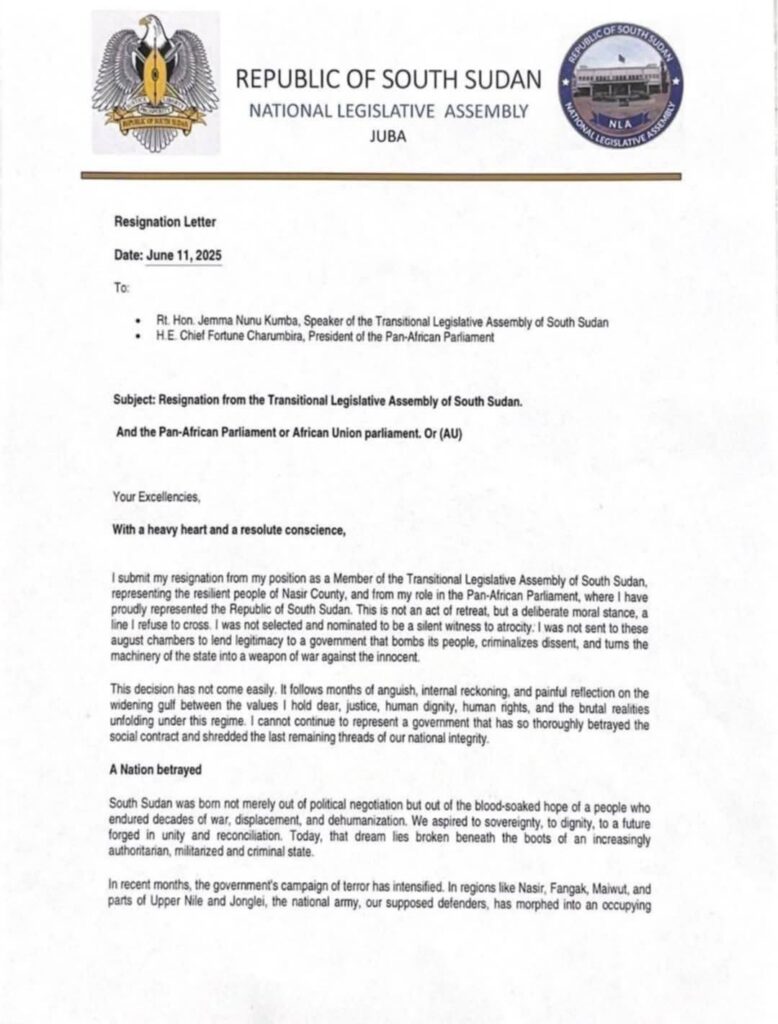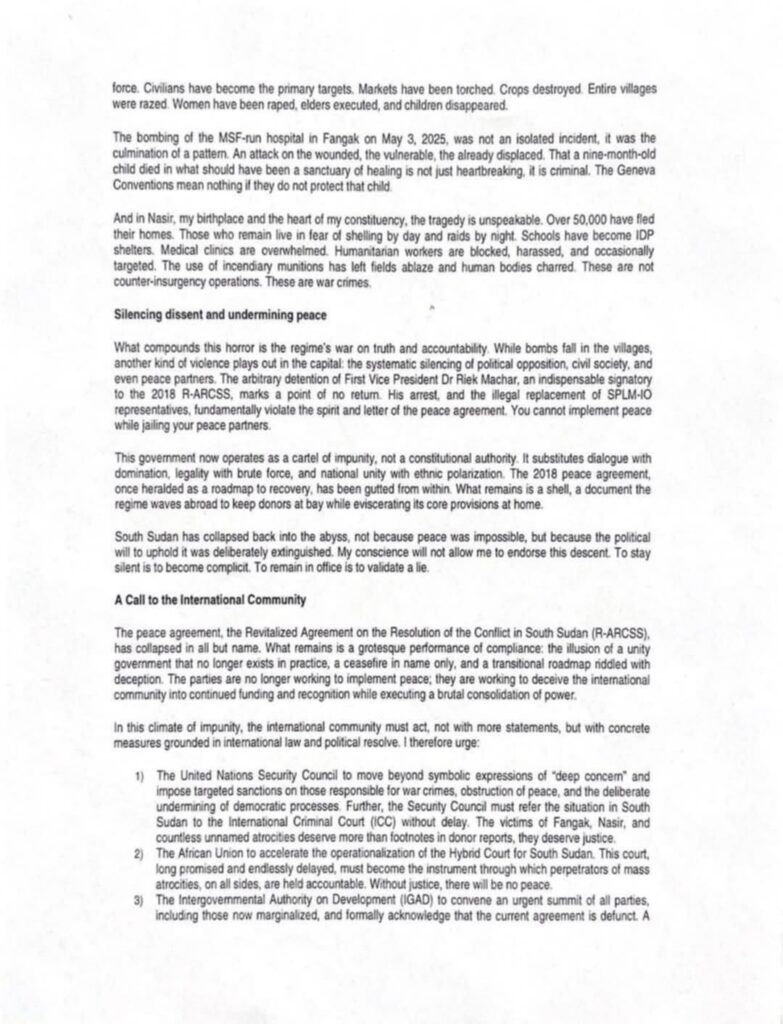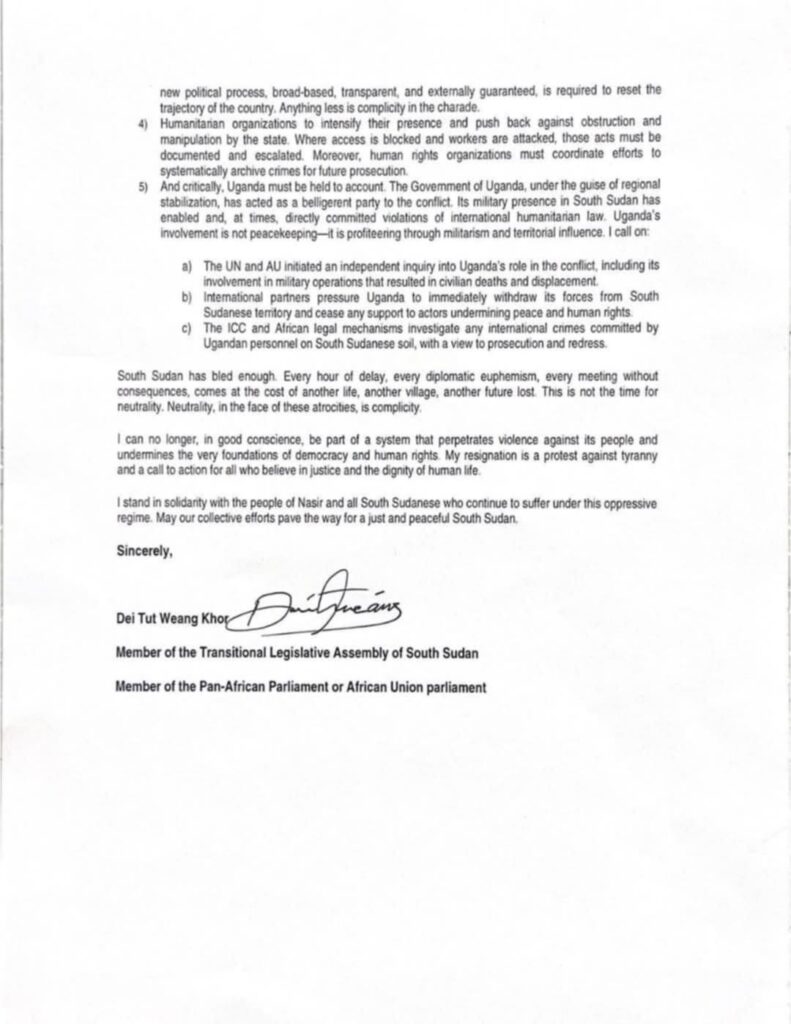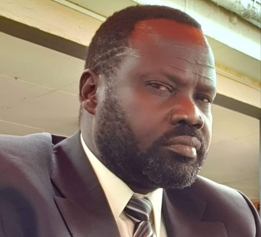Hon. Dei Tut Weang Khor, a former member of the Transitional National Legislative Assembly (TNLA) representing Nasir County and a member of the Pan-African Parliament resigned from both roles on Wednesday, citing several reasons like the SSPDF and Ugandan Airforce bombing civilians in his constituency, and political repression and arbitrary arrests of opposition politicians among others.
“I submit my resignation…where I have proudly represented the Republic of South Sudan. This is not an act of retreat, but a deliberate moral stance, a line I refuse to cross,” he wrote in his resignation letter. “I was not selected and nominated to be a silent witness to atrocity: I was not sent to these august chambers to lend legitimacy to a government that bombs its people, criminalizes dissent, and turns the machinery of the state into a weapon of war against the innocent.”
In an exclusive interview with Radio Tamazuj, Tut said he cannot continue to represent a government that has so betrayed the social contract and shredded the last remaining threads of national integrity. He called for the revocation of Vice President Bol Mel’s appointment, saying he is unknown to the people and brought renewed violence to South Sudan by hiring Ugandan soldiers who are paid USD 100 per day to bombard and kill innocent civilians.
The former lawmaker also urged the United Nations Security Council to impose targeted sanctions on those responsible for war crimes, obstruction of peace, and the deliberate undermining of democratic processes, and the African Union to accelerate the operationalization of the Hybrid Court for South Sudan. He also called on the Intergovernmental Authority on Development (IGAD) to convene an urgent summit of all parties, including those now marginalized, and formally acknowledge that the current agreement is defunct.
Below are edited excerpts:
Q: Why did you resign?
A: Yes, I indeed resigned. I have reasons that made me resign. My party is called United Democratic Republican Alliance (UDRA), which is a member of the South Sudan Opposition Alliance (SSOA), and when we went to Juba to implement the peace agreement, we went with a clean heart and tried our best. I was in the High Committee for Peace Implementation, which was led by Paul Mayom, and witnessed what was going on before the implementation. We implemented the first phase very well, but we got stuck in phase two, where the armed forces were to be reorganized and sent for training. It looked like there was no political will from the government side to implement phase two. We struggled, but up to now it has not been implemented. The reason I brought this to our discussion is that the lack of implementation is what caused the current crisis.
The second reason is the issue of Nasir, where these young boys (White Army) have always been fighting with the SSPDF. We went there to find out what was exactly happening between the White Army and the SSPDF and came back with recommendations and even Gen. James Koang, who is now the governor of Upper Nile State, also went there and came back with some recommendations. The White Army said they do not trust the SSPDF soldiers in Nasir and said they should be removed, and the Unified Forces, comprised of all the tribes, deployed in their place. We came and gave that recommendation to the government, and we requested the government, as parliamentarians from Nasir, that we need to go home and conduct meetings with our people. Some elements in the government promised us that we would have an aircraft to take us to Nasir to talk to our people. We spent one year without going to Nasir.
We made another request to the government that we needed to go to Nasir because the tensions between the White Army and SSPDF were escalating, but there was no response.
Q: Why would parliamentarians seek permission from the government to visit their constituency?
A: Well, we did not have a means of transport because the parliament itself has no money, so we went to the presidency to ask for support to charter an aircraft to take us.
Q: What is your next move after resignation?
A: I am a politician and the leader of UDRA and have followers, so I will consult my people, and we will discuss what to do. I took an independent decision because the members of UDRA also have their own decisions.
Q: Do you think resignation is the only solution, or are there other solutions to address the problems in Nasir and across the country?
A: Well, I think the solution is to fully implement the peace agreement and train our army to be a national army to take over the security of South Sudan so that nobody will fight. However, the government does not have the political will to implement whatever peace plan we come up with.
Q: What do you see happening if the peace agreement is not implemented?
A: You know South Sudan very well, and now we are heading to a serious dictatorship, and I cannot determine the future of the country.
Q: What is the current situation in Nasir?
A: I communicate with the people on the ground all the time, and the local authorities tried to negotiate with the government to provide passage for humanitarian assistance, but the government denied it. The government said they do not want the UN to take food to the people who were displaced from Nasir.
Secondly, resigned because I wrote a letter to the government through parliament to stop the aerial bombardment because they were dropping chemical weapons, cluster bombs, and fuel on women, children, and elderly people, because even the regime in Khartoum did not do this during the liberation struggle. There was no response. I also wrote to the European Union to talk to the South Sudanese government, but I did not get a response. It is the Government of Uganda, which is hired by the Government of South Sudan, that is bombing the people. How can you hire another government to come and kill your people? So, because there were no responses to my letters, I decided to resign because it cannot happen on my watch, and I remain quiet as the area member of parliament. Even if it happened in another area, I would speak out and say no.
Q: Do you know how many Ugandan soldiers are currently in South Sudan and how much they are being paid to bomb South Sudanese?
A: I cannot give you a number, but I saw them myself on 11 February when I left Juba. Each Ugandan soldier is paid USD 100 a day, and I think the money to pay them comes from individuals because our money is in the hands of individuals, because government employees have salary arrears of 14 months. Every in South Sudan knows that the public funds are controlled by two people whose names I will not mention.
Q: Has your resignation been accepted?
A: I sent it to parliament and addressed it to Speaker Jemma Nunu Kumba.
Q: What was your role at the Pan African Parliament, and did you effectively represent South Sudan?
A: At the Pan African Parliament, we deal with continental issues, so we did not achieve much, but we have proposals like the one passport for Africa on the table. However, some other countries do not want to be part of the proposals we made.
Q: What is your message to the people and the Government of South Sudan?
A: To the people, my message is that we need peace so that we can cultivate and develop our country. To the government, my message is that we need real peace, and this needs political will. Even if we sign another peace, it will also collapse. I encourage President Salva Kiir to think twice because his colleagues, with whom he fought, are watching us.
So, we do not need to make the country a dictatorship, and Vice President Bol Mel will not take us forward. I appeal to President Kiir to revoke the appointment of Bol Mel and appoint another capable person because Mel is the one who brought the Ugandan troops to come and kill South Sudanese. Mel is a new person who is not even known by the people and should not come in with violence. So, President Kiir should remove him before the country collapses.
Q: Can you return to South Sudan any time soon?
A: I will not go back to Juba because in our country, when you say no to something, you become an enemy of the state. Now, after writing that letter, I became an enemy of the state of South Sudan, so I cannot go and join the government of Kiir. I will go to Nasir in two months or somewhere else in Upper Nile and live there.
Q: How will you reach Nasir?
A: There are so many ways to reach Nasir.







